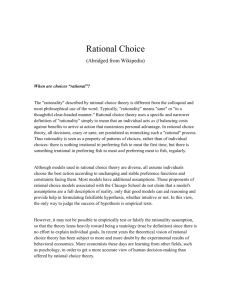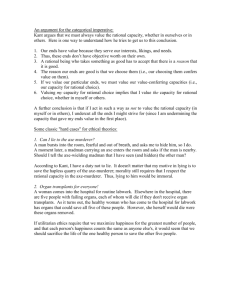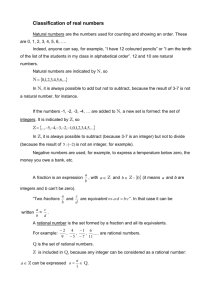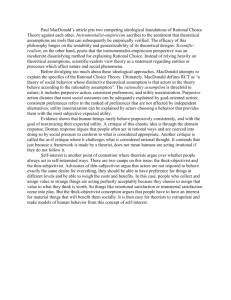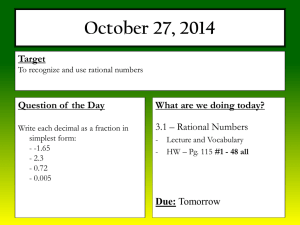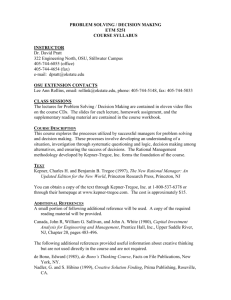Theoretical and practical rationality
advertisement
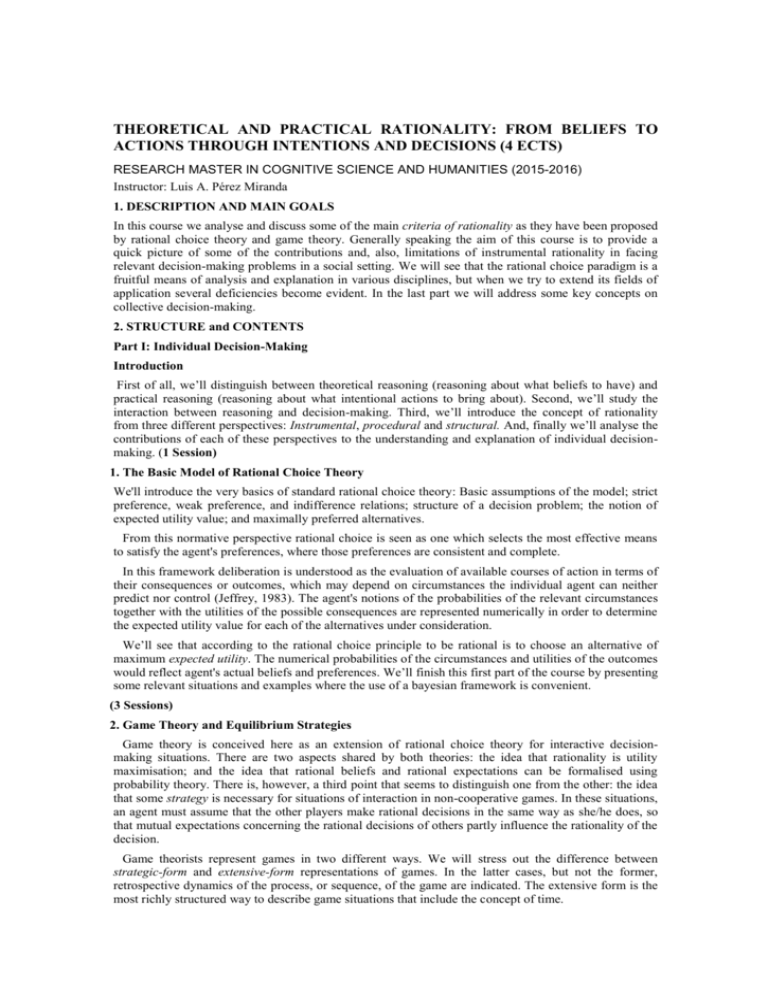
THEORETICAL AND PRACTICAL RATIONALITY: FROM BELIEFS TO ACTIONS THROUGH INTENTIONS AND DECISIONS (4 ECTS) RESEARCH MASTER IN COGNITIVE SCIENCE AND HUMANITIES (2015-2016) Instructor: Luis A. Pérez Miranda 1. DESCRIPTION AND MAIN GOALS In this course we analyse and discuss some of the main criteria of rationality as they have been proposed by rational choice theory and game theory. Generally speaking the aim of this course is to provide a quick picture of some of the contributions and, also, limitations of instrumental rationality in facing relevant decision-making problems in a social setting. We will see that the rational choice paradigm is a fruitful means of analysis and explanation in various disciplines, but when we try to extend its fields of application several deficiencies become evident. In the last part we will address some key concepts on collective decision-making. 2. STRUCTURE and CONTENTS Part I: Individual Decision-Making Introduction First of all, we’ll distinguish between theoretical reasoning (reasoning about what beliefs to have) and practical reasoning (reasoning about what intentional actions to bring about). Second, we’ll study the interaction between reasoning and decision-making. Third, we’ll introduce the concept of rationality from three different perspectives: Instrumental, procedural and structural. And, finally we’ll analyse the contributions of each of these perspectives to the understanding and explanation of individual decisionmaking. (1 Session) 1. The Basic Model of Rational Choice Theory We'll introduce the very basics of standard rational choice theory: Basic assumptions of the model; strict preference, weak preference, and indifference relations; structure of a decision problem; the notion of expected utility value; and maximally preferred alternatives. From this normative perspective rational choice is seen as one which selects the most effective means to satisfy the agent's preferences, where those preferences are consistent and complete. In this framework deliberation is understood as the evaluation of available courses of action in terms of their consequences or outcomes, which may depend on circumstances the individual agent can neither predict nor control (Jeffrey, 1983). The agent's notions of the probabilities of the relevant circumstances together with the utilities of the possible consequences are represented numerically in order to determine the expected utility value for each of the alternatives under consideration. We’ll see that according to the rational choice principle to be rational is to choose an alternative of maximum expected utility. The numerical probabilities of the circumstances and utilities of the outcomes would reflect agent's actual beliefs and preferences. We’ll finish this first part of the course by presenting some relevant situations and examples where the use of a bayesian framework is convenient. (3 Sessions) 2. Game Theory and Equilibrium Strategies Game theory is conceived here as an extension of rational choice theory for interactive decisionmaking situations. There are two aspects shared by both theories: the idea that rationality is utility maximisation; and the idea that rational beliefs and rational expectations can be formalised using probability theory. There is, however, a third point that seems to distinguish one from the other: the idea that some strategy is necessary for situations of interaction in non-cooperative games. In these situations, an agent must assume that the other players make rational decisions in the same way as she/he does, so that mutual expectations concerning the rational decisions of others partly influence the rationality of the decision. Game theorists represent games in two different ways. We will stress out the difference between strategic-form and extensive-form representations of games. In the latter cases, but not the former, retrospective dynamics of the process, or sequence, of the game are indicated. The extensive form is the most richly structured way to describe game situations that include the concept of time. Game theorists have developed a very sophisticated analysis of 'equilibrium' strategies in games, but precisely why it is rational for players to choose these strategies remains a matter of dispute. In game theory several solutions to games have been proposed. The most important and central one is probably Nash equilibrium. We will discuss its meaning and uses quite extensively. There are, however, critical aspects derived from its use that have led to the project of refining that notion. Further, many social interactions are repeated either with the same person or with people who are drawn from the social group. The analysis of repeated games enables us to extend the scope of game theory considerably. We will see that repeated games are ‘suitable’ models for phenomena like cooperation, trust, and punishment. (4 Sessions) 3. Non-cooperative games and their applications: coordination, prisoners' dilemma and chicken In this part or the course we will consider three non-cooperative games that seem to represent relevant situations of social interaction and have deserved the attention of social scientists. Here we want to emphasise that non-cooperative game theory focuses on how some kind of cooperation can emerge as rational behaviour from situations of non-binding agreement. In particular we'll consider real applications of very basic games like coordination, prisoner's dilemma, and chicken. Coordination: In this game there are at least two equilibria and the players must each decide which to aim for. The key point about coordination games is that the players have a mutual interest in coordinating. Since there is no conflict of interest, it would be odd if rational agents failed to find mutually beneficial solutions, at least with repeated play. Prisoner's dilemma: The puzzle that emerges from this dilemma illustrates a conflict between individual and collective rationality. A collective whose components pursue rational self-interest may all end up worse than a collective whose members act contrary to rational self-interest. We will provide a variety of precise characterisations of this dilemma. Chicken: This game differs from prisoner's dilemma in having two equilibria with pure strategies. On the one hand, players will benefit if they can avoid simultaneous chicken behaviour, so there are gains from some sort of cooperation. On the other, there is also conflict because depending on the way they reach cooperation the benefits will be differently distributed between the players. (3 Sessions) Part II: Some Key Concepts in Collective Decision-Making In this part of the course, we abandon individual decision-making to pay attention to decisions taken by a group or collective to which the rational agents belong. 1. The problem of preference aggregation We'll show here that the rationality postulate fails to deal with the problem of preference aggregation in the social sciences. Results derived from several works on the nature of the logic of collectives have undermined the idea that social action is a sum of individually optimising behaviour in the sense of the original rational choice-paradigm, and that collective action can be ascribed to an optimising collective agent. The utility function of an aggregate is not reducible to the sum of the utility functions of all its members. (1 Session) 2. Arrow's Impossibility Theorem and its consequences We'll present that theorem in an informal way and comment on some of its most important consequences. This theorem entails that a collective utility function based on the rational choice principle leads us to conflict and paradox situations. Put in other words, no social-welfare function is possible which satisfies a number of prima-facie highly reasonable assumptions about such a function. There can be no ideally rational aggregation device. (1 Session) 3. ASSIGNMENTS AND EVALUATION Every student will be expected to participate in the classroom discussions and presentations, and do the proposed exercises and comments on selected readings. Every student will be expected to submit a short paper (no more than 10 pages long, times 12, double space) about one of the themes of interest discussed along the course. Classroom presentations (1 Session) (20%), classroom comments on selected readings and exercises (30%), Final paper (50%). 4. BACKGROUND READING Allingham, M. (2002), Choice Theory: A Very Short Introduction. Oxford, Oxford University Press. Axelrod, R. (1984), The Evolution of Cooperation. New York, Basic Books. Bicchieri, C. (1998), Decision & Game Theory. Routledge Encyclopedia of Philosophy. Colman, A.M. (1999), Game Theory and Applications. London, Routledge. Elster, Jon (2008), Reason and Rationality. Princeton, NJ, and Oxford: Princeton University Press. Gustason, W. (1994), Reasoning from Evidence. New York, MacMillan College Publishing Company. Hargreaves, S. et al. (1992), The Theory of Choice. Oxford, Blackwell. Hollis, M. (1994), The Philosophy of Social Sciences. Cambridge, Cambridge University Press. Jeffrey, R. (1983), The Logic of Decision. Chicago, Chicago University Press. Mele, Alfred R. & Piers Rawling (Eds.) (2004), The Oxford Handbook of Rationality. Oxford, Oxford University Press. Osborne, M.J. & Rubinstein, A. (1994), A Course in Game Theory. Cambridge, MA, The MIT Press. Osborne, M.J. (2009), An Introduction to Game Theory. Oxford, Oxford University Press. Romp, G. (1997), Game Theory. Introduction and Applications. Oxford, Oxford University Press. Weston, A. (2000), A Rulebook for Arguments. Cambridge, Avatar Books. 5. FURTHER READING Arrow, K. J. (1951), Social Choice and Individual Values. New York, Wiley & Sons. Arrow, K. J. (1996), Preface. In K. J. Arrow et al. (eds.) The Rational Foundations of Economic Behaviour. London: MacMillan. Arrow, K.J. (1950), "A difficulty in the concept of social welfare". Journal of Political Economy, 58: 328-46. Axelrod, R. (1997), "The evolution of strategies in the iterated prisoner's dilemma". In The Dynamics of Norms, C. Bicchieri eta al. (Editors). Cambridge, Cambridge University Press. Collins, R. (1994), Four Sociological Traditions. Oxford, Oxford University Press. DiFinetti, B. (1975), Theory of Probability. New York, Wiley. Gärdenfors, P. & N. E. Sahlin (eds.) (1988), Decision, Probability, and Utility. Cambridge, MA, The MIT Press. Harsanyi, J. C. (1977), Advances in understanding rational behavior. In “Foundational Problems in the Special Sciences”, R. E. Butts & J. Hintikka (eds.). Dordrecht, D. Reidel, 315-43. Hollis, M. & S. Sudgen (1993), "Rationality in Action". Mind 405, 1-35. Larrazabal, J.M. and L.A. Pérez Miranda (1996), "The Rational Choice Principle: Scope and Limits in the Foundations of the Social Sciences". Report No. ILCLI-96-CS-2. The University of the Basque Country (UPV-EHU). Mackay, A.F. (1980), Arrow's Theorem: The Problem of the Social Choice. New Haven and London: Yale University Press. Nida-Rümellin, J. (1994), “Rational Choice: Extensions and Revisions”. Ratio (New Series) VII 2: 122-44, December 1994. Poundstone, W. (1993), Prisoner’s Dilemma. John von Neumann, Game Theory and the Puzzle of the Bomb. New York, Anchor Books. Satz, D. and J. Ferejohn (1994), "Rational Choice and Social Theory". The Journal of Philosophy 41, 71-87. Savage, J. L. (1972), The Foundations of Statistics. New York, Elsevier. Scanlon, T. (2002), What We Owe to Each Other (Cambridge, MA: Harvard University Press, 1998). Scarre, G. (1996), Utilitarianism. London, Routledge. Sen, A.K. (1970), Collective Choice and Social Welfare. San Francisco, Holden-Day. Sen, A.K. (2009), The Idea of Justice. London, Penguin books. Skyrms, B. (1980), Causal Necessity. New Haven, Yale University Press. Tversky, A. & Kahneman, D. (1974), "Judgment under uncertainty: heuristics and biases". Science 185, 1124-31. Ullman-Margalit, E. (1977), The Emergence of Norms. Oxford, Clarendon Press. Varoufakis, Y. (1991), Rational Conflict. Oxford, Blackwell. Vickrey, W. (1960), "Utility, Strategy, and Social Decisions Rules". The Quarterly Journal of Economics, 4: 507-535. von Neumann, J. & Morgenstern, O. (1944), Theory of Games and Economic Behavior. New York, Wiley. Weale, A. (1992), "Social Choice", "Democracy", in Hargreaves, S. et al. (1992), The Theory of Choice. Oxford, Blackwells.

